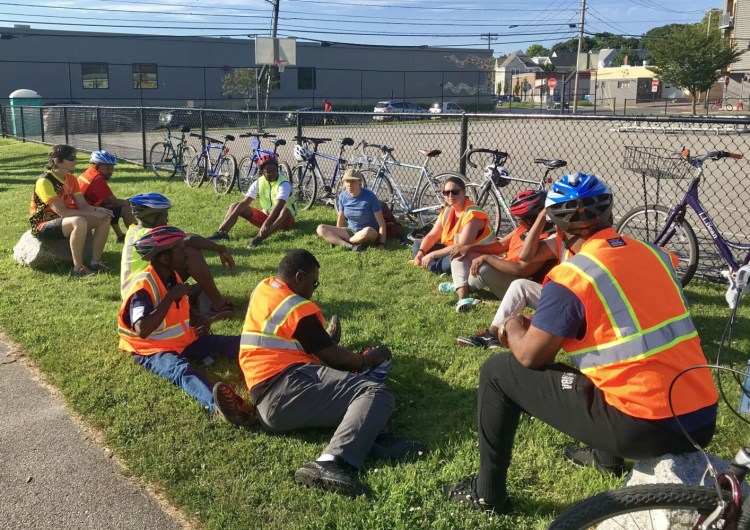The sound of tools clinking against metal bicycles fills Portland Gear Hub on Washington Avenue in Portland.

Jose Mavungo celebrates his Bikes for All Mainers certificate at the Portland Gear Hub Bike School, 85 Anderson St. “On the bike you are free,” he said, “and you don’t need to spend money on things like gas or bus tickets.” Blair Best/The Forecaster
It’s 5:30 p.m. on a Thursday and nine immigrants are learning how to install kickstands onto the cranks of refurbished bikes – the final step in preparation for a 5-mile ride around the East End.
If they complete the ride, they graduate from the Portland Gear Hub’s Bikes for All Mainers program and get to take home their refurbished bikes.
“When you move away from home, you are vulnerable to new freedoms of all kinds, and bikes can help to ground people,” said Ainsley Judge, 29, Portland Gear Hub’s director and one of the lead instructors of Bikes for All Mainers.
The earn-a-bike program for adults began in 2014, when the Bicycle Coalition of Maine launched an educational series to teach traffic skills to immigrants who were unfamiliar with the rules of Maine roads.
After a year, the coalition’s assistant director, James Tasse, decided the program had to include not just new Mainers, but all Mainers.
“We realized that there are plenty of low-income people in Maine who could also benefit from access to a bicycle,” he said.
In 2015, the coalition changed the name of the program and partnered with the Portland Gear Hub, a nonprofit that collects, refurbishes, and resells used bicycles and outdoor equipment. When it started running Bikes for All Mainers, it structured the classes to include mechanic skills in addition to traffic knowledge and pedaling practice.
“When we decided to go with a model where the students learn how to work on the bikes themselves, we needed to find a bike shop,” Tasse said. “Since the PGH has a huge commitment to serving the underserved, they fit perfectly.”
Over the seven years of Bikes for All Mainers, 125 people have learned how to ride safely around Portland. While the classes are open to all Mainers, Judge said immigrants are the majority in every session.
“Most of the students we have in class are undocumented immigrants who are seeking asylum,” she said. “And we don’t believe in giving out anything for free, so we make it about earning a bike.”
Currently, the program has more than 100 applications and enough funding for 50 students. Each year, the remaining applicants are placed on a waiting list for the following summer, and as the program continues to grow, Portland Gear Hub and the Bicycle Coalition of Maine look for sponsors to finance it.
“There is clearly a high demand, and our ability to fund the classes is limited,” Tasse said. “Hopefully we find someone to help us.”
To join the program, applicants must provide contact information, the language they speak, and demonstrate that they have basic bike-riding skills. Once admitted into the class, they must complete six hours of training in two three-hour classes. Their reward is a free bike, helmet, lock and safety accessories.
With seven sessions every summer, Judge’s goal is seven graduates at the end of each session. When the fifth session finished on July 18, eight students earned a bike, growing the number of this year’s graduates to 32.
To begin the class on July 18, Judge led the group into Kennedy Park. There they sat in a circle and answered two questions: How long had they been in Maine, and why were they looking forward to taking their bike home?
More than half had been living in Maine for 10 months, and four had moved to Maine less than five months ago. Their reasons for joining the program were nearly identical: to save money and have an independent mode of transportation.
Maine allows documented immigrants to apply for a driver’s license after they have lived in Maine for 30 days. However, for undocumented and unemployed immigrants, buying and maintaining a car is difficult, so they look to Portland Gear Hub’s bike school as a way to access affordable transportation.
“The bike is something that you don’t need to disturb your neighbor with,” said Jose Mavungo, 40, who moved from South Africa to Maine with his wife 10 months ago. “On the bike you are free, and you don’t need to spend money on things like gas or bus tickets.”
Mavungo said he heard about Bikes for All Mainers from his teachers at Portland Adult Education. He said he is practicing his English and learning how to write a resume while he waits to apply for a work permit, and graduating with a bike means he’ll be able to get to interviews and meetings on time.
After all in the circle introduced themselves, they completed a “quick check” – a three-part test of the air pressure of their tires, the front and rear brakes, and the chains.
“We aren’t just teaching them how to ride a bike, we are showing them the new city that they live in,” Judge said as she guided the group along the Eastern Promenade Trail toward East End Beach, a part of Portland that most of the students had never seen. “We always do a mix of this trail and then some on-street riding through traffic, because I want them to feel like they can do it all.”
While Portland Gear Hub provides access to bikes, it also instills in students a feeling of freedom and equality.
“There is a human connection and sense of freedom when you pull up to an intersection on a bike and see other bikers riding alongside you,” Judge said. “It doesn’t matter who they are or where they came from. For one moment, you all feel the same.”
Send questions/comments to the editors.



Comments are no longer available on this story